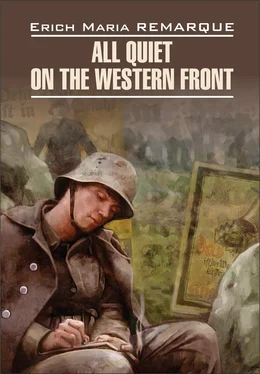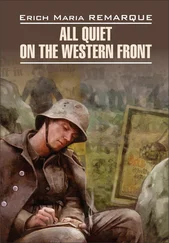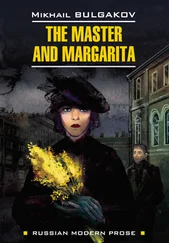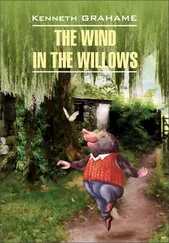‘You’ll be going home now,’ says Kropp. ‘You would have had to wait at least another three or four months before you got leave.’ Kemmerich nods. I can’t look at his hands, they are like wax. The dirt of the trenches is underneath his fingernails, and it is bluey-grey, like poison. It occurs to me that those fingernails will go on getting longer and longer for a good while yet, like some ghastly underground growths, long after Kemmerich has stopped breathing. I can see them before my eyes, twisting like corkscrews and growing and growing, and with them the hair on his caved-in skull, like grass on good earth, just like grass – how can all that be? Muller leans forward. ‘We’ve brought your things, Franz.’ Kemmerich gestures with one hand. ‘Put them under the bed.’ Muller does as he says. Kemmerich starts on about the watch again. How can we possibly calm him down without making him suspicious?
Muller bobs up again with a pair of airman’s flying boots, best quality English ones made of soft yellow leather, the sort that come up to the knee, with lacing all the way to the top – something really worth having. The sight of them makes Muller excited, and he holds the soles against his own clumsy boots and says, ‘Are you going to take these with you, Franz?’
All three of us are thinking the same thing: even if he did get better he would only be able to wear one of them, so they wouldn’t be any use to him. But as things are it would be a pity to leave them here – the orderlies are bound to pinch them the moment he is dead.
Muller repeats, ‘Why don’t you leave them here?’
Kemmerich doesn’t want to. They are his prize possession.
‘We could do a swap,’ suggests Muller, trying again, ‘you can really do with boots like that out here.’ But Kemmerich won’t be persuaded.
I kick Muller, and reluctantly he puts the splendid boots back under the bed.
We chat for a bit longer, and then say goodbye. ‘Chin up [34] Chin up – Не вешай нос!
, Franz.’
I promise him that I will come back tomorrow. Muller says that he will as well. He is still thinking about the flying boots and he wants to keep an eye on things.
Kemmerich groans. He is feverish [35] He is feverish – Eго лихорадит
. We get hold of a medical orderly outside, and try and persuade him to give Kemmerich a shot of morphia.
He says no. ‘If we wanted to give morphia to everyone we’d need buckets of the stuff —’
‘Only give it to officers, then, do you?’ snarls Kropp.
I step in quickly and the first thing I do is give the orderly a cigarette. He takes it. Then I ask him, ‘Are you allowed to give shots at all?’
He is annoyed. ‘If you think I can’t, what are you asking me for – ?’
I press a few more cigarettes into his hand. ‘Just as a favour —’
‘Well, OK,’ he says. Kropp goes in with him, because he doesn’t trust him and wants to see him do it. We wait outside.
Muller starts on again about the flying boots. ‘They would fit me perfectly. In these clodhoppers even my blisters get blisters. Do you think he’ll last until we come off duty tomorrow? If he goes during the night we’ve seen the last of the boots —’
Albert comes back and says, ‘Do you reckon —?’
‘Had it,’ says Muller, and that’s that.
We walk back to camp. I’m thinking about the letter I shall have to write to Kemmerich’s mother tomorrow. I’m shivering, I could do with a stiff drink. Muller is pulling up grass stems and he’s chewing on one. Suddenly little Kropp tosses his cigarette away, stamps on it like a madman, stares round with an unfocused and disturbed look on his face and stammers, ‘Shit! Shit! The whole damned thing is a load of shit!’
We walk on for a long time. Kropp calms down – we know what was wrong, it’s just the strain of being at the front, we all get that way from time to time.
Muller asks him, ‘What did Kantorek say in his letter?’
He laughs. ‘He calls us “young men of iron”.’
That makes the three of us laugh, though not because it is funny. Kropp curses. He is happy to be able to talk again —
And yes, that’s it, that is what they think, those hundred thousand Kantoreks. Young men of iron. Young? None of us is more than twenty. But young? Young men? That was a long time ago. We are old now.
I find it strange to think that at home in a drawer there is the first part of a play I once started to write called ‘Saul’, and a stack of poems as well. I spent so many evenings on them – we all did things like that – but it has all become so unreal to me that I can’t even imagine it any more.
When we came out here we were cut off, whether we liked it or not, from everything we had done up to that point. We often try to find a reason or an explanation for this, but we can never quite manage it. Things are particularly confused for us twenty-year-olds, for Kropp, Muller, Leer and me, the ones Kantorek called young men of iron. The older men still have firm ties to their earlier lives – they have property, wives, children, jobs and interests, and these bonds are all so strong that the war can’t break them. But for us twenty-year-olds there are only our parents, and for some of us a girlfriend. That isn’t much, because at our age parental influence is at its weakest, and girls haven’t really taken over yet. Apart from that, we really didn’t have much else; the occasional passion for something, a few hobbies, school; our lives didn’t go much further than that as yet. And now nothing is left of it all.
Kantorek would say that we had been standing on the very threshold of life itself. It’s pretty well true, too. We hadn’t had a chance to put down any roots. The war swept us away. For the others, for the older men, the war is an interruption, and they can think beyond the end of it. But we were caught up by the war, and we can’t see how things will turn out. All we know for the moment is that in some strange and melancholy way we have become hardened, although we don’t often feel sad about it any more.
If Muller wants Kemmerich’s flying boots, this doesn’t make him any more unfeeling than somebody who would find such a wish too painful even to contemplate. It’s just that he can keep things separate in his mind. If the boots were any use at all to Kemmerich, Muller would sooner walk barefoot over barbed-wire than give a single thought to getting them. But as it is, the boots are objects which now have nothing to do with Kemmerich’s condition, whereas Muller can do with them. Kemmerich is going to die, whoever gets them. So why shouldn’t Muller try and get hold of them – after all, he has more right to them than some orderly. Once Kemmerich is dead it will be too late. That’s why Muller is keeping an eye on them now.
We have lost all our ability to see things in other ways, because they are artificial. For us, it is only the facts that count. And good boots are hard to come by.
We were not always like that. We went down to the local recruiting office, still a class of twenty young men, and then we marched off en masse [36] en masse (фр.) – все вместе, все разом
, full of ourselves, to get a shave at the barber’s – some of us for the first time – before we set foot on a parade-ground [37] set foot on a parade-ground – ступить на армейский плац
. We had no real plans for the future and only very few of us had thoughts of careers or jobs that were firm enough to be meaningful in practical terms. On the other hand, our heads were full of nebulous ideas which cast an idealized, almost romantic glow over life and even the war for us.
Читать дальше












